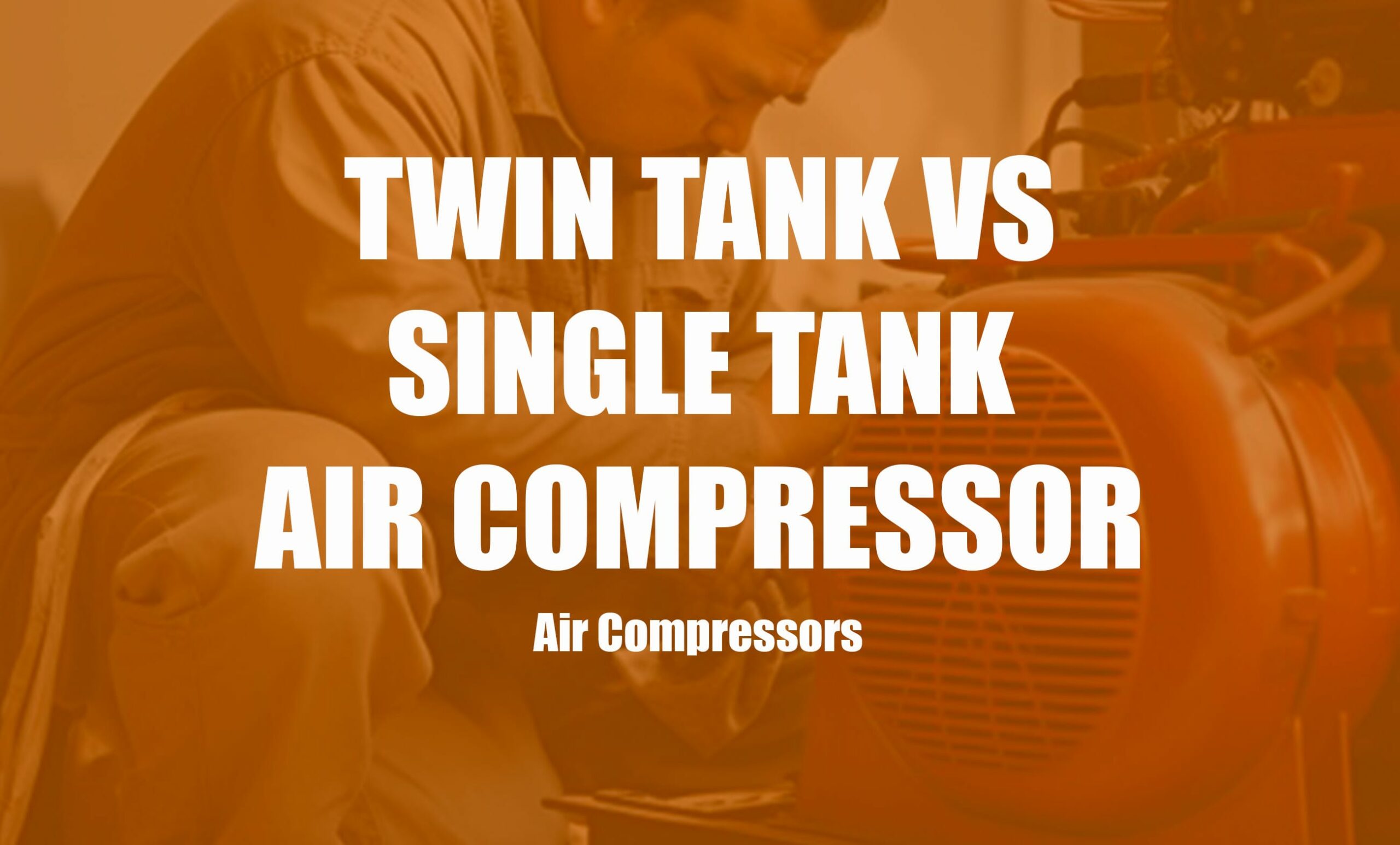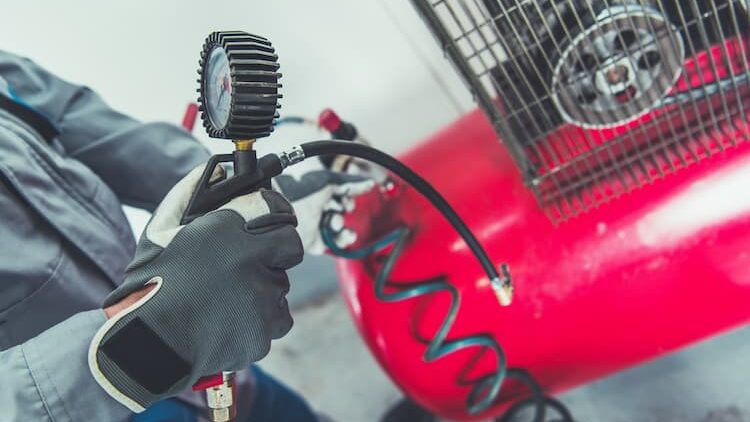Are the differences between twin tank and single tank air compressors confusing you?
That shouldn’t come as a surprise, given that there aren’t many experts capable of providing a comprehensive comparison between these two types of air compressors.
This is why I thought it would be a good idea to write an easy-to-read guide comparing a twin tank vs single tank air compressor so you, the reader, can get a better idea of what might be best for your specific needs.
Let’s get started with the comparison.
Twin Tank vs Single Tank Air Compressor
Here are the main factors to focus on when comparing twin tank vs single tank air compressors:
Runtime
If you’ve ever used a pneumatic tool (such as a framing nailer) with an air compressor, you know how important the runtime is.
A longer runtime ensures more consistent air flow and pressure, which is essential for applications that require a constant supply of air, such as running a mechanic’s air impact wrench to change hundreds of tires in a day.
A single tank air compressor has a much shorter runtime than its twin tank counterpart. This is because they have less space to store air pressure because they only have one air tank.
Twin tank air compressors, on the other hand, have two air tanks, which allows them to store more air, giving users more capacity to run pneumatic tools for longer periods of time, allowing them to tackle more intensive jobs.
Refill Time
Another critical factor to consider is the time it takes to refill the air compressor.
Who wants to look like a fool while their air compressor refills its air pressure so they can continue using their pneumatic tools?
In that case, single tank air compressors have a clear advantage because they have one less air tank. As a result, there is half as much volume to fill with air pressure, making the refilling process much faster.
Twin tank air compressors, on the other hand, have twice the space to fill with air pressure in order to keep pneumatic tools running, which means twice the refill time.
Portability
Let’s say you get an air compressor to later find out that it’s a pain in the you-know-what to move around.
Now you’re stuck with your wallet missing hundreds of dollars and an air compressor you can’t actually use.
To prevent this from happening, you must first know what kind of design and form-factor the next air compressor you’re about to get has.
A single tank air compressor is known for not only having one sole air tank, but also a smaller motor and form-factor which makes the overall footprint of the air compressor compact and lightweight.
On the other hand, a twin tank air compressor has two air tanks and a bigger motor that makes the air compressor itself bulky and heavy.
Budget
Money is what keeps the world running, and unless you’re rich, you’re supposed to make your hard-earned dollars last (or so my wife told me!).
This is why comparing the prices of various air compressors is essential.
Single tank air compressors are built with small and simple parts (e.g. small motor, one small air tank, etc). This means that they are made with less expensive materials, allowing manufacturers to offer single tank air compressors at a low cost.
Twin tank air compressors, on the other hand, are more expensive than single tank models. This is due to the use of more expensive materials, such as two air tanks rather than one, and more powerful motors.
Noise
When looking for air compressors, the noise they make when running becomes a serious factor to consider.
Who wants to work next to a loud air compressor for 8 to 10-hour shifts?
As a result, single air tank air compressors are noisy. This is due to the fact that they are built with weaker motors that must work hard to provide the solid level of air pressure that most pneumatic tools require.
Twin tank air compressors, on the other hand, are built with stronger and more advanced motors that allow them to not only provide higher PSI ratings, but also do so quietly.
What are the Benefits of Single Tank Air Compressors
Wondering about what are the benefits of investing your hard earned dollars on a single tank air compressor?
Here you got the main benefits that a single air tank compressor brings to the table:
Portability
You may have a limited amount of space and are looking for a portable air compressor that does not take up too much room.
If that defines you, single tank air compressors are ideal because they are compact and lightweight.
Because they only have one air tank, they take up much less space and are built with smaller components (e.g., smaller engines), making them ideal for those who value portability.
They are also very lightweight, which is a huge benefit if you need to transport your air compressor around the job site.
Faster Refill
An air compressor’s compressed air can be used for a variety of tasks, including powering pneumatic tools, inflating tires, and more.
The problem is that once all of the compressed air stored by the air compressor is released, you must wait for its motor to refill the air tank with air pressure.
The time it takes to do this is known as “refill time,” and it is critical to the speed with which you work.
Single tank air compressors only have smaller air tanks, which means they take less time to refill. This is a huge benefit, especially if you want to increase productivity and efficiency.
Price
Single tank air compressor are not only made with one less air tank than twin tank air compressor, but also with cheaper components that makes the air compressor itself more affordable.
This is an substantial advantage if you’re looking for a cheaper air compressor and you aren’t willing to be spending lots of money in a tool like this.
What are the Benefits of Dual Tank Air Compressors
You’ll find that dual tank air compressors have a few advantages over their single tank counterparts. These are the most important ones:
More Runtime
If you’re one of the fortunate few who can obtain a twin tank air compressor, you’ll quickly notice its main advantage: it has a significant runtime.
Because of its dual air tanks, this type of air compressor can store more compressed air, allowing users to run their pneumatic tools for longer periods of time, letting them to handle heavier tasks.
So, if you’re looking for an air compressor that can provide consistent airflow for a longer period of time, a twin tank air compressor might be your best bet.
Durability
If you want to add an air compressor that you know will last for decades, a twin tank air compressor is the way to go.
Why?
Twin tank air compressors, on the other hand, have stronger and more advanced internal components that allow them to run more efficiently for longer periods of time, making them more durable than single tank counterparts.
For Heavier Applications
If you’re in the market for an air compressor that will run your most needed pneumatic tools while you work on intensive jobs for hours, then a twin tank air compressor is the best choice for you.
Due to them having two tanks, these air compressors are able to output more air pressure for longer which is key for boosting efficiency. This will allow users to work on heavy tasks with total ease.
Comparison Table
| Single Tank Air Compressor | Twin Tank Air Compressor | |
| Runtime | Less runtime | More runtime |
| Refill Time | Faster refill | Slower refill |
| Portability | More portable | Less portable |
| Budget | Cheaper | More expensive |
| Noise | Noisier | Quieter |
Frequently Asked Questions
Here are some of the most frequent questions asked about the comparison between single tank and twin tank air compressors.
Why have dual tanks on an air compressor?
Dual tanks in air compressors are beneficial because they allow for more air pressure storage thanks to their dual tanks.
So, if you’re planning on running your pneumatic tools for longer and you happen to need an air compressor, then a dual tank air compressor might be for you.
Is a bigger tank better for an air compressor?
It depends.
An air compressor with a larger air tank means more air pressure storage, which is necessary for running your pneumatic tools for a longer period of time.
However, because the air compressor has a larger air tank as part of its structure, it may become bulkier and heavier.
So, if you want an air compressor that can output a stream of airflow pressure for a longer period of time to power your pneumatic tools and don’t mind portability, an air compressor with a larger air tank should suffice.
Otherwise, a more portable air compressor (for example, a single tank air compressor) should be more appropriate.
What to use dual tank air compressors for?
A dual tank air compressor is known for its increased air storage. Due to this, it’s perfect for intensive tasks that require a longer runtime of air pressure such as:
- Automotive repairs of medium-large sized vehicles
- Heavy duty painting
- Roofing and framing
What to use single tank air compressors for?
Due to their single air tank, single tank air compressors are more compact and lightweight than twin tank air compressors.
They are, however, not as powerful as other dual-tank air compressors. As a result, they are appropriate for lighter jobs requiring only intermittent use of air power tools, such as:
- Casually inflating tires
- Using framing nailers for home-grade furniture building
- Changing small-sized vehicles’ tires

